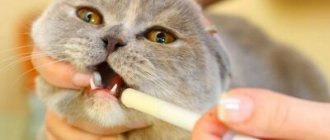4153Pavel
Before you ask yourself the question “how to choose a kitten?”, you must be sure that you have enough time, effort and money to care for your new pet. You need to understand that babies are very playful. They will try to play with the curtains, they will curiously explore the shelves and cabinets in your house, and also do many other things that you will not be happy with. However, if all this does not bother you, you are confident that you can properly care for a kitten, and have decided to get such a pet, then our article is for you.
It is very important to make the right choice, because for many people, pets become full-fledged family members and friends. We will tell you about the main points when choosing a pet, which you need to pay attention to first of all, so that the kitten you choose fully meets all your expectations.
© shutterstock
Cat classes
All types of cats are divided into classes. Depending on whether the owner intends to prepare the cat for an exhibition, or simply wants to have a pet “for the soul”, the costs of purchasing the animal are planned.
Show class
This category includes cats that can take part in exhibitions. Depending on the breed and pedigree, the price of kittens changes. Most often, they are bought by breeders who plan to sell offspring in the future, as well as people who are interested in participating in exhibitions with their pets.
Breeding class
It includes animals with a pedigree, and the more significant it is, the higher the cost. Breeding kittens are often valued higher than show-class animals. They are interesting for breeders because they have some characteristic feature in appearance and can produce large offspring (this can be traced by pedigree).
In this category there are purebred kittens that, for some reason, do not reach the standards required to obtain admission to the exhibition. If the owner does not care about this, but at the same time does not want to take a cat without a breed, it is worth looking for a pet from this class.
In the breed class, minor deviations are as follows:
- not too saturated eye shade;
- ears are smaller than standard;
- the coat is longer than usual;
- simpler tail shape.
Experienced breeders say that it is enough to choose the right pair, and as a result, you will be able to produce offspring with the best characteristics that allow the kittens to be classified as show class.
Pet class
These are ordinary animals that are not intended for breeding and participation in exhibitions. However, they are completely healthy and outwardly, for a layman, are no different from purebred animals.
Where are cats found?
The maintenance of animals in pet stores and pet markets leaves much to be desired. Gatherings of large numbers of people, as well as drafts, can provoke the emergence and spread of infectious diseases. The kitten can live there for a long time until it is purchased. The store bears the cost of its maintenance, which is why the cost is quite high. Many people find pets of the desired breed via the Internet after finding out the breeder's address. Such a purchase has its advantages. Firstly, the manufacturer’s price, bypassing intermediaries, will be much cheaper. But real British kittens cost a lot, or, for example, Maine Coons. Secondly, after studying the conditions in which kittens grow, you will definitely make your choice. If they live in an apartment, this inspires confidence regarding the baby’s health. You will be able to create approximately the same conditions; there will be no global changes in environmental factors affecting the kitten.
Different prices for kittens: main reasons
Pet class kittens are the cheapest. The higher the category, the higher the price tag will be. The first thing included in the price is the breeder's expenses. He needs a good pair that will produce healthy offspring, the cost of which is at least 120 thousand rubles.
Next, you need to feed the kittens, provide them with proper care, prepare documents for the pedigree, and get vaccinations. You need to recoup the costs within 3-5 years, because this is the maximum period during which it is recommended to obtain offspring from a cat. It is also prohibited to allow more than 2-3 litters per year, because the animal’s body must recover after childbirth and lactation.
The price is also influenced by the nursery's reputation, class, and pedigree. People line up for popular breeders, and he can decide what price to set. The cost is often influenced by the rarity of the color or the structural features of certain parts of the body. For example, a fold-eared kitten costs more than a straight-eared one.
Which is better: an adult cat or a kitten?
To decide who is better to adopt: a kitten or an adult animal, you need to evaluate many factors. In this case, issues of the animal’s appearance, its gender, and breed fade into the background. It is important to take into account your temperament, age, marital status, presence of children, lifestyle, living conditions.
Yes, kittens are chosen more often, but only because they are charming, cute, and playful. Who doesn’t want to have such a “living toy”. But adult cats also have a lot of advantages. And given that many of them live to be 18-20 years old, you should not immediately refuse to adopt an adult cat. They will have time to give you their love and affection.
Small kittens need more care and attention. The first time must be spent on socializing the pets, accustoming them to life in a new place, teaching them to go to the litter box and use a scratching post. They require a lot of veterinary care during the first year of life. The owners will be required to create a safe, comfortable space for active, inquisitive children to live.
Adult cats, as a rule, no longer need to be taught to go to the toilet or use a scratching post. They do not need to be fed as often as small kittens. You can get love, affection and companionship from adult cats with much less effort. They are usually calmer and less active than restless kittens.
Pros of buying a kitten
- You will be able to live together longer.
- They have fewer behavioral problems due to previous negative experiences.
- You have the opportunity to obtain more accurate information about your health and ancestry.
Disadvantages of buying a kitten
- More thorough medical attention and care is needed.
- Kittens need to be given more time and attention.
- They need to be fed more often.
Who are kittens suitable for?
- Families in which someone is always at home.
- Families with older children.
- Young active families.
Who is better to adopt an adult cat?
- Families with small children.
- Single working people and families where people are away from home most of the day.
- To old people.
Optimal age and best places to choose
In order for kittens to quickly get used to their new home, it is better to take animals that are not too old. Usually these are kittens 9-12 weeks old, at this age they can already be separated from the cat. Immunity will allow them to adapt to the environment and eat regular food. By three months, babies already know how to use the litter box, which is important for a family that is planning to get a pet. The main thing is that by this age the character of the animals is already visible, which allows you to find kittens that match the temperament of their owners.
Several options for where to buy an animal:
- It’s cheap on the market, but the seller can hide important information about the kitten’s health, its breed and other nuances.
- On the Internet - many people go abroad and are faced with an allergy to wool, which forces them to sell animals, and often the prices for a British or other purebred kitten are favorable.
- At a shelter - for a nominal cost, a person can take a kitten from there, which was given away by the owners or thrown onto the street, and now they are looking for a new owner.
- At the exhibition - if you want to buy a purebred kitten, you can meet the breeder or simply choose a pet for yourself at the event itself.
How to choose the right kitten for a child?
First of all, before buying a kitten, it must be carefully examined, but it is better for parents to do this without the presence of the child. Remember, it is best to carry out the purchase in two stages: in the first stage, parents choose a cat, and in the second stage, show the child the choice of mom and dad!
Parents often have a question about who is better to buy a cat or a kitten. In such a situation, it is worth knowing the advantages of both sexes. The fact is that cats are more affectionate and like to spend more time in the arms of their owner, while cats have a calmer temperament and love solitude.
In addition, you need to remember that these animals are purposeful and if they notice something, then, as a rule, everything that is in their way can fall, break and break.
If it comes to an amorous issue, then you need to remember that the animal can be subjected to sterilization or castration. While this goes away quickly in cats, cats need time for rehabilitation after surgery; this should also be taken into account when purchasing an animal.
In addition, it is worth considering the age of the kitten; it is recommended to buy it at the age of 2.5 months. If you buy a very small animal, then when you bring it home, it can easily contract a viral disease. In addition, he will need to be potty trained for a long time and will not be able to properly care for himself.
Also, when purchasing, he must be vaccinated, this is done so that he does not get sick. Therefore, the seller must show the buyer a special card indicating that the cat is vaccinated.
You should also pay attention to the cat's fur - it should be smooth and shiny, and when stroking the animal, the hand should simply slide. Next, you should pay attention to the animal’s skin - for light breeds it should be light pink, and for dark breeds it should be a dark blue hue. The skin should be free of scratches, bald patches, and there should be no spots, redness, or fleas.
It is necessary to carefully examine the eyes; they should be clean, bright and focused on the person who is examining the animal. There should be no redness, sourness, or tears in the eyes. It is also worth paying attention to the ears - they should have pale pink, clean skin.
Next, the buyer should not be embarrassed to look under the cat’s tail; the hole should have a pale pink color, without any redness.
It is worth assessing the condition of the oral cavity; to do this, you need to lift the upper lip and look at the kitten’s bite; in ideal condition, the upper jaw should overlap the lower jaw. After this, it is worth assessing the mucous membrane of the mouth - it should be pale pink, there should be no plaque, spots, or wounds on the tongue or cheeks.
Thus, following these simple rules, you can easily give your baby a fluffy bundle of happiness.
Kitten from the street: main problems
The way to adopt a kitten from the street seems to be the easiest. But the owner will have to face a number of difficulties. Such an animal is usually diagnosed with at least one disease, and more often a whole bunch, they require mandatory treatment from a veterinarian. The costs of which sometimes exceed the cost of a purebred kitten.
If a small child lives in the house, it is dangerous to bring a kitten from the street, because it may have worms, lichen and other diseases that can be transmitted to people. Also, you should not expect such a pet to be calm and affectionate, because it is not socialized and has not lived with people before. In this regard, kittens that were born in an ordinary apartment and were not weaned from the cat early win. An animal taken from the street needs to be tamed for a long time.
How to determine if you are ready to buy a kitten
Before making a purchase, answer these questions:
- Does everyone in the family want to have a cat? Talk to your household, warn them of your intention, listen to possible concerns and wishes. Having a pet is a responsibility. Its maintenance will require the participation of all family members. It is important that everyone is willing to accept and care for the animal.
- Are your family members allergic to cats? It is important to clarify this before an animal appears in the house.
- If you have other pets, will they be able to accept a new pet? Some dogs perceive small kittens as prey. The baby himself, with his irrepressible energy and curiosity, can irritate sedate adult cats. And it is dangerous to leave rodents and birds alone with a kitten.
- Do you have enough money for maintenance? It is important to analyze your budget to see if it is enough to support a new pet. Consider the cat's lifespan; the budget should be enough for the long term.
- Do you have enough time to devote to your kitten? Evaluate your schedule. Analyze whether your family has the opportunity not to leave the baby alone for a long time. Kittens need to be fed regularly, their tray changed, and played with.
- Will your children be able to get along with their new pet? To ensure a successful life together for your little family members and your animal, choose a pet from the best cat breeds for children.
Pet class kittens: additional information
If you don’t want to spend money overpaying for a breed, but taking an animal from the street is not an option, you can buy a pet-class kitten. Their features:
- it is strictly forbidden to engage in breeding;
- external data may differ slightly from generally accepted standards, but they do not affect the quality of life of the animal;
- minor genetic defects are possible (kinked tail, hernia).
In order not to buy a pig in a poke...
Age is important!
It is not recommended to adopt a newborn kitten. Some believe that even at 3 months he is not yet ready for independent life. In any case, the kitten must be 2 months old at the time of purchase. You can’t suddenly change your diet in a new place. You need to listen to the advice of breeders regarding food, find out which products are suitable as complementary foods. If it is not possible to purchase what the animal is accustomed to, there is always an alternative.
Find out if the kitten has been trained to use a tray and scratching post. Often, unscrupulous sellers claim that the kitten will not be able to live without a tray, but in reality, unpleasant surprises await you. You will have to teach the kitten.
The organs of vision, hearing and touch must be clean, without pathologies or secretions. A healthy cat has a clean mouth with pink gums and straight teeth, and the fur is shiny and glossy.
You need to make sure whether the animal has been treated for fleas and worms, and whether the kitten has been vaccinated. The first vaccination is given at 8–12 weeks of age. Information about the date and name of the drug is included in the registered veterinary passport. In addition, you will find out the address of the veterinarian.
It's good if the kitten responds to its name. If not, pick up derivative and easy-to-pronounce pet names and begin to develop a conditioned reflex. An affectionate and fluffy pet will bring a good mood and positivity into your home.
Cost of keeping a kitten per month
Before purchasing, it is advisable to plan your expenses as much as possible.
| Primary expenses | |
| Item | Cost in rubles |
| Tray | 650-700 |
| A bowl | 100-700 |
| Comb | 300 |
| Rug or bed | 600 |
| Carrying bag | 1000 |
| scratching post | 500 |
| Monthly expenses | |
| Item | Cost in rubles |
| Feed | 1000 per 2 kg (usual rate for 30 days) |
| Filler | 300-500 |
Periodic expenses involve the purchase of anthelmintics and vitamins (200-500 rubles). Also, trips to the veterinarian for vaccinations and examinations will require costs, which depend on the price list of a particular clinic.
Thus, it is advisable to have 4,000 rubles available initially, and then allocate 2,000-2,500 each month for the maintenance of the animal - this is the minimum expense. The upper limit depends on whether the owner chooses branded products for the animal or buys regular carriers and scratching posts, what vitamins he purchases, and how often he takes the animal to the veterinarian. In any case, with proper care, the pet will respond to its owner with love and give a good mood.
How to find your four-legged friend among others?
It often happens that in a litter of several kittens, one will purposefully approach a person. This is probably his kitten. If the baby instinctively showed interest in his future owner, his choice probably should not be neglected. He will become a devoted, loyal friend and an obedient pet.
An interesting detail that can tell you how to choose the right kitten is also the behavior of babies in a common flock. It all depends on the potential owner’s ideas about what a cat should be like at home. If you need a nimble, playful baby with leadership abilities, then you need to pay attention to this one. If you have a different picture in your imagination, for example, warm family gatherings in the evening with an affectionate cat in your arms, then you need to take a closer look at the calm, friendly baby.
Boy or girl?
Many people do not buy cats for home because of kittens, because while the cat is small, it makes no difference whether it is a boy or a girl, but then problems begin. People prefer cats because he won’t yell and ask for a mate, much less give birth to kittens. But is this right? Many people do not take into account that the cat will mark its territory, and your curtains and wallpaper will be covered with yellow spots, which will also emit a terrible smell. You should never beat a cat, and the problem can be prevented by castration, but are you ready for that? After all, the cat’s hormonal balance will change, and he will gain excess weight and become very passive.
But a cat is not an ideal choice either, because nature dictates that a cat should give birth to kittens, and you cannot deceive nature. She will yell and tear up the wallpaper, but naturally, not every day. Their exacerbations occur in the spring and autumn, lasting from a week to two, and even if you sterilize the cat, she will still scream and ask for a cat.
So, there are no perfect options, and cats and cats both have flaws, so choose the one you like better.
Origin matters: whether to buy a purebred kitten
Mixed-breed cats are great. A variety of colors and coat types, high intelligence and vitality - all this is inherent in outbred animals. A barn cat can grow larger than a Maine Coon, fluffier than a Persian, and nobler than any breed. Except that there are no sphinxes among them yet. Then does it make sense to buy a kitten from an elite cattery if it is possible to adopt a pet for free? In addition, it is outbred kittens that usually need a home and caring hands.
If you want to save someone's life, love all cats in general, or just want a cat of a certain color (pure white or black cat, calico cat), then a mongrel pet is a great option.
However, a yard kitten is a kind of lottery. It is not known what size he will grow, what character traits will appear. This is a real “pig in a poke”, an option for those who believe in fate or are naturally gambling.
If you want predictability, then a purebred cat is perfect. Despite the fact that any animal is an individual with its own characteristics, there are pronounced breed traits: the Cornish Rex is a sociable electric broom, the British is an independent couch potato, the Maine Coon is a good-natured giant, and so on. You know in advance what the pet will look like (breed standards), the object of admiration for all random guests, your pride.
If you want to breed cats, you need to purchase only animals with documents and good exhibition prospects, and not multiply the army of outbred and stray kittens.
Regarding health problems, there is a persistent myth that mestizos supposedly do not get sick. And they say they don’t need vaccinations, and they can even digest nails and live up to 30 years. Whereas purebred animals are sissies and generally genetic freaks, which is why they live on artificial feed at an exorbitant price.
The truth is in the middle. Various cat breeds do have hereditary diseases (polycystic kidney disease in Persians, osteochondrodysplasia in Scottish Folds). But if you buy a kitten from a club, the risk of such problems is minimized. There are breeds of cats, among which there are often long-livers (18-20 years) - for example, Thai, and in native breeds (Siberian, Russian Blue) - health is no less good than that of yard cats.
Outbred kittens just as much need vaccinations, parasite treatments, and quality nutrition as their blue-blooded counterparts.
Thus, a purebred kitten from a nursery is not a matter of prestige or a desire to show off. It’s just that such a pet’s appearance and character traits will form a familiar picture: many people keep only Siamese or only British dogs all their lives, unable to change their favorite breed. And if all your life you have dreamed of a huge cat with tufted ears, affectionate, but so wild in appearance - why not buy a Norwegian Forest kitten or Maine Coon.
Behavior of a healthy kitten
The personality traits of a healthy kitten are noticeable even to a layman: a well-fed and happy baby is playful, active and inquisitive. But if a cute-looking little animal sits in the corner as an indifferent lump, there is reason to think about the advisability of purchasing it. Features of behavior:
- Games . The little nimble predator touchingly demonstrates all the habits of the king of beasts. He carefully claws a fluffy toy mouse with his paws and lies in ambush, hunting for a teaser fishing rod with bright feathers. Having played out, the tailed mischief maker makes masterful acrobatic jumps, hangs on the curtains and gets into fights with his brothers.
- Appetite . Young active animals do not suffer from lack of appetite, so it makes sense to ask the owner of the mother cat to feed the babies. After purchase, it is important to follow the kitten’s usual diet for some time, if necessary, gradually switching it to a new one (for example, from natural food to dry food).
- Personal care . Kittens begin to take care of themselves and lick themselves from the age of 4 weeks, doing this after sleep, every feeding and even stroking by a person. It’s great if the little neat guy, after having lunch, begins to wash himself thoroughly, combing the fur with his tongue and cleaning his claws.
- Toilet . Usually, a mother cat teaches her babies to go to the litter box, so a 2-month-old kitten doesn’t shit just anywhere. However, when purchasing, you should specify the type of cat litter, since an unusual substrate can scare away the baby.
- Contact with a person. Despite the freedom-loving nature of felines, an affectionate and sociable baby is preferable as a pet. He will voluntarily approach a stranger, sniff and introduce himself, jump into his arms, begin to stomp his paws and purr peacefully. Wild and wary little animals can, on the contrary, show a defensive reaction, hide and hiss, and when trying to pet them, they will hit with their paw.











